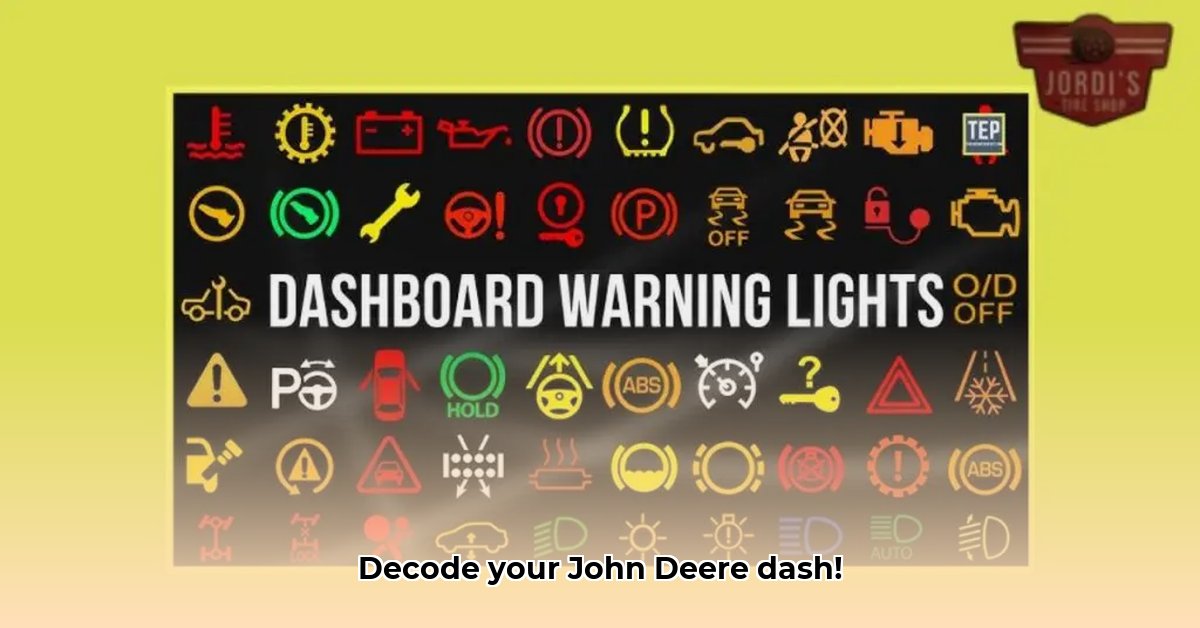
Ever feel lost staring at your John Deere tractor's dashboard? Those flashing lights and cryptic symbols can be intimidating, but this guide will help you understand what your tractor is trying to tell you. We'll decode the dashboard symbols, explain their meanings, and provide straightforward troubleshooting steps. Whether you're a seasoned operator or just starting out, this guide will empower you to address dashboard warnings and keep your tractor running smoothly. For more in-depth John Deere maintenance, check out this helpful resource: John Deere Maintenance Guide.
Understanding the Color Code
Your tractor's dashboard uses a color-coded system to communicate the urgency of a problem. This is your first line of defense against potential issues:
Red: This indicates a critical system failure. Immediate action is required! Shut down the tractor immediately and do not restart until the issue is resolved. Continuing operation could cause significant damage or create dangerous situations.
Amber (Yellow): An amber light signifies a caution. While not immediately critical, it indicates a potential problem that needs attention to prevent more significant issues later.
Green: Generally, a green light indicates that the relevant system is operating normally.
Blue: Blue lights usually provide informational updates, such as the status of engaged functions like the PTO (Power Take-Off) or differential lock.
Decoding Common John Deere Tractor Dashboard Symbols
The symbols themselves can be confusing, but understanding their meaning is key to effective troubleshooting. The following table lists some common symbols and their meanings:
| Symbol | Meaning | What to Do | Severity |
|---|---|---|---|
| Red STOP Light | Critical system failure; immediate shutdown required. | Shut down immediately! Do not restart until the problem is diagnosed. | Critical |
| Low Oil Pressure | Insufficient engine lubrication. | Stop immediately; check oil level. Low oil can cause catastrophic engine damage. | Critical |
| High Engine Temperature | Engine overheating; risk of serious damage. | Stop immediately and allow the engine to cool completely before investigating. | Critical |
| Low Fuel Level | Low fuel; requires refueling. | Refuel your tractor as soon as possible. | Warning |
| Parking Brake Engaged | Parking brake is engaged. | Release the parking brake before driving. | Warning |
| Differential Lock Engaged | Differential lock is engaged. | Check if engagement is necessary; disengage for normal driving. | Informational |
| PTO (Power Take-Off) Engaged | Power take-off is operational. | Disengage when finished. | Informational |
| Battery Warning Light | Potential battery problem. | Check battery connections and charging system. | Warning |
| Engine Warning Light | Indicates a broader engine issue. | Consult your owner's manual for specific diagnostics. | Warning |
Important Note: This is a general guide. Always consult your tractor's specific operator's manual for detailed interpretations and model-specific information. This manual is your most valuable resource.
Troubleshooting Steps: A Systematic Approach
Dealing with a warning light? Follow these steps:
Safety First: Always prioritize safety. Pull over to a safe location, engage the parking brake, and, if the light indicates a critical problem (red light), shut down the engine immediately.
Identify the Warning: Note the color and symbol of the warning light.
Consult Your Owner's Manual: Refer to your operator's manual for detailed instructions on diagnosing and addressing the specific warning.
Perform Basic Checks: Visually inspect fluid levels (oil, coolant, fuel), check for leaks, and examine belts and hoses for damage. Simple issues are often easily resolved.
Seek Professional Help: If you can't identify or resolve the problem, don't hesitate to contact a qualified John Deere mechanic. Ignoring problems can lead to costly repairs.
Beyond the Basics: Additional Considerations
Multiple Warnings: Multiple warning lights simultaneously usually point to a complex issue. Immediate assessment and professional assistance may be necessary.
Model-Specific Variations: Symbols and interpretations can vary slightly between John Deere models. Always refer to your tractor's specific manual.
Preventative Maintenance: Regular maintenance—fluid checks, filter changes, and inspections—significantly reduce the likelihood of unexpected warning lights and major repairs. Consider this preventative maintenance your first line of defense.
This guide provides a foundational understanding of your John Deere tractor's dashboard indicators. However, always prioritize your operator's manual for detailed and model-specific guidance. Your safety and your tractor's well-being depend on it. Remember, proactive maintenance and a thorough understanding of your tractor's communication system are vital for efficient and safe operation.